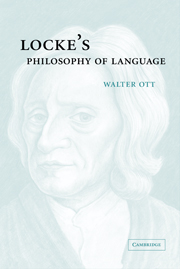Book contents
- Frontmatter
- Contents
- Acknowledgements
- Note on textual references
- Introduction
- 1 Signs and signification
- 2 Particles and propositions
- 3 Essence and abstraction
- 4 Locke contra the Aristotelians: signification and definition
- 5 Beyond the bounds of sense?
- 6 The reception of Locke's philosophy of language
- 7 Conclusion
- Bibliography
- Index
4 - Locke contra the Aristotelians: signification and definition
Published online by Cambridge University Press: 22 September 2009
- Frontmatter
- Contents
- Acknowledgements
- Note on textual references
- Introduction
- 1 Signs and signification
- 2 Particles and propositions
- 3 Essence and abstraction
- 4 Locke contra the Aristotelians: signification and definition
- 5 Beyond the bounds of sense?
- 6 The reception of Locke's philosophy of language
- 7 Conclusion
- Bibliography
- Index
Summary
With this background in place, we can now see how Locke deploys his linguistic thesis in an argument against the Aristotelians. For Locke's investigations into the nature of language are not gratuitously added on to the rest of the Essay. They have a clear polemical purpose: to guard against confusion, both quotidian and philosophical. Locke holds that some of the chief obstacles to the advancement of knowledge stem from an ignorance of the workings of words. In particular, the Aristotelian conception of empirical inquiry as directed at uncovering de re definitions stems from a fundamental misconception of the signification of words. Before we can see this, however, we must begin with a sketch of the position under attack.
LOCKE'S OPPONENTS
According to the Aristotelian family of views, definition proceeds by assigning a difference to a genus: thus in the definition of man, animal is the genus, rationality the difference. The properties of the thing (such as risibility in humans) flow from its essence; they are not essential, but instead are a result of the essence. Other traits are accidents, which do not flow from the essence. Within accidents, we can distinguish separable ones (such as baldness in humans) from inseparable (such as the blackness of a crow). A definition expresses the essence of a substance; indeed, an essence just is the substance, insofar as it is knowable by the intellect. In Aquinas's terminology, “definition” refers to the definiens, which is not of subject-predicate form: “definitions … do not declare that something is or is not.”
- Type
- Chapter
- Information
- Locke's Philosophy of Language , pp. 78 - 94Publisher: Cambridge University PressPrint publication year: 2003



